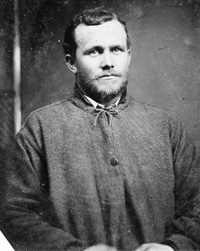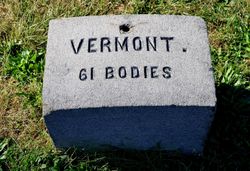"My ever dear Lettie:
"This is probably the most welcome message that you ever received from me. I have time to write but few words. This is the first opportunity I have had. I have been engaged nearly all the time for the past few days in one of the worst battles this continent ever knew. We are all well except Floyd,8 who went to the hospital this morn. None of us were hurt in battle but Floyd is all tired out, but think he will be all right when he gets rested. 2 out of my company were killed and 7 wounded. A spent-ball struck me, knocking me down but I got right up again madder than ever.
"This is probably the most welcome message that you ever received from me. I have time to write but few words. This is the first opportunity I have had. I have been engaged nearly all the time for the past few days in one of the worst battles this continent ever knew. We are all well except Floyd,8 who went to the hospital this morn. None of us were hurt in battle but Floyd is all tired out, but think he will be all right when he gets rested. 2 out of my company were killed and 7 wounded. A spent-ball struck me, knocking me down but I got right up again madder than ever.
E. P. Davis of Felchville was killed.
O such scenes such scenes. I cannot write now but will if ever I get time. I am sitting on the battlefield now and there is a man here who says he will try and get this to some P.O. He is waiting, I must close. We have suffered for want of food on the long march and the fight. I haven't had a mite of clothing on me night or day except my Blouse & Pants for 3 days and nights and slept right in the mud without a tent or a sign of anything. We lived on excitement for two days certain for I didn't eat more than two or three hard tacks all the time. We won a great victory and are now following the enemy. I counted 115 dead Rebels today on a piece of ground 4 rods square. The troops have all left, except the W. Brigade. We are burying the Rebs now and shall leave as soon as we get done. Our Reg't won the admiration of all for its gallantry, having captured 3 stand of colors and lots of prisoners.
"I will write again as soon as I possibly get time. From your loving husband, Elmer" ~ E.D. Keyes, Captain Company H, Sixteenth Vt.
"I will write again as soon as I possibly get time. From your loving husband, Elmer" ~ E.D. Keyes, Captain Company H, Sixteenth Vt.
* Floyd Hawkins, Elmer;s brother in law:
July 3, Friday
This morning at 4 o’clock the pickets commenced firing at each other, just to the left of where I was, and soon the artillery commenced it was heavy, shelled us till afternoon before they showed themselves much. I lay about 1/4 mile from the batteries. About 3 o’clock I saw them forming to advance, in a few minutes the musketry began and such firing seems so was never heard before, and was kept up till dark. The 16th made two charges and captured three stands of colors. After dark we were taken back to the rear.
Saturday, July 4
Today has been very quiet. The rebels ain’t been seen today, they think they are retreating. The battlefield is completely covered with dead and begins to smell bad. I am all used up. I hurt my hip yesterday..
Sunday, July 5.
It rained all night. The regiment was ordered to move this afternoon so I had to come to the hospital about 5 miles from the battlefield.
Monday, July 6 .
There is between 4 & 5 thousand wounded here. . .
~ Floyd Hawkins, Sergeant, Company H, Sixteenth Vt
July, Wednesday 1.
started at 10 oclock & marched to Gettysburg & camped for the night. is rainy with showers David goes on guard. heavy firing
Thursday 2
We march out under a hill & were under heavy fire all this afternoon. The 1[3]th charged on battery & took 8 pieces.
July, Friday 3, 1863
is very hot day was under heavy firing all day. We charged on the rebs and took two flags David is wounded in the leg.
Saturday 4
is cloudy wet and muddy. we moved over the hill & camped in an orchard by a barn. is a very rainy night.
Sunday 5.
is cloudy all day. we moved in the morning over beyond the rifle pits and staid all day. the men were burying the dead
~ Diary of William Martin Ballou. private, Company F, Sixteenth Vt
After the battle, the regiment followed in pursuit of Lee's retreating army until Lee crossed the Potomac into Virginia, when it was ordered home, its term of enlistment having expired. The regiment arrived in New York during the draft riots and remained there until order was restored. It was finally mustered out at Brattleboro, Aug. 10, 1863. The total enrolment of the 16th was 968, of whom 735 began the 7-day march to Gettysburg and 661 arrived in the field. 24 were killed in action or mortally wounded; 48 died of disease and 1 died in prison - total deaths, 73. Eighty men were wounded, 4 were captured and 2 deserted.
The Brigadier General commanding, in view of the gallantry and efficiency of the 13th, 14th and 16th Vermont Regiments, displayed at the battle of Gettysburg, directs that the flags of each of the regiments be inscribed "Gettysburg;" that the people of the State may be reminded at the sight of these flags of the men who bore and honored them in the hour of national danger and triumph , and that every soldier may justly be proud of his devotion to country, and credit done to the State....~Brig. Gen. Geo. J. Stannard, General Order No. 10, July 15,1863.
But while the entire command may well be proud of its laurels, they will not forget to remember the fallen dead. Let their names be embalmed in the hearts of their comrades! Let their memory be green as the sod that covers them! Let their virtues and example be a watchword in coming time! Let the tear of sympathy alleviate the sorrow of relatives and friends!
"We are once more in our native State, whose green hills and pleasant valleys we left to fight in this war for right and freedom. But not all have returned. Those whose lives were consecrated on the bloody field of Gettysburg, who fell nobly fighting for their country, as well as others who died in camp and on the march, are absent but not forgotten.
"All honors to the defenders of our country, and when the cause of this Rebellion -- slavery -- shall have been ended, and in its stead is heard the voice of FREEDOM, then shall we be a happy and prosperous people." ~ John C. Williams, Corporal, Co. B, 14th Regiment, Life in Camp 167 (1864).





